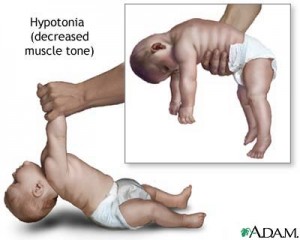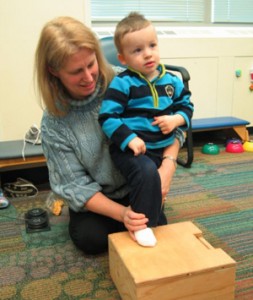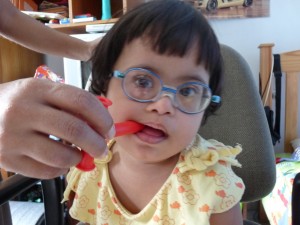Coping with Hypotonia
What Is It?
Hypotonia is a condition in which the patient has poor or decreased muscle tone. This is not the same as muscle weakness; however, patients with hypotonia often do have weaker muscles. With hypotonia, the brain fails to transmit the proper electrical signals to the muscles that tell them to contract. Hypotonia may be present in varying degrees of severity. It can be caused by a wide range of diseases and conditions, including muscular dystrophy, cerebral palsy, Down syndrome, trauma, and genetic disorders.
What Does This Mean For My Child?
Children with hypotonia are sometimes referred to as having “rag doll” syndrome or “floppy baby” syndrome. They cannot properly hold up their heads and their arms tend to lay by their sides. If your child has hypotonia, he likely has poor mobility, poor flexibility, and reduced feeding abilities. Hypotonia also affects speech and breathing. One mom of a child with hypotonia noted that while her daughter seemed to understand much or all of what is said to her, she had great difficulty responding. Hypotonia does not affect the child’s intellect or receptive language skills, but it can severely impact the child’s expressive language skills.
Evaluation
Your child’s doctor will run a series of tests to determine the extent of the condition. He may use x-rays and other tests to check muscle and nerve function. He will also assess your child’s balance, coordination, and motor skills. Whenever possible, your child’s underlying medical condition will be treated.
Treatment
Hypotonia may sometimes gradually improve with treatment. A physical therapist might use a sensory stimulation program, which involves facilitating muscle contractions by stretching and tapping the muscles. Physical therapy may help improve fine motor control. Your child will also likely be treated by an occupational therapist. The occupational therapist will also work to improve fine motor control.
Speech Therapy
Children with hypotonia often have trouble breathing and vocalizing. Hypotonia can affect the ability to move oral structures like the jaw, lips, and tongue. It can also affect the quality and rate of speech, often resulting in slurred or slowed speech. A speech-language pathologist (SLP) can help your child improve his swallowing and feeding abilities, as well as address his speech delays. She may help him improve his oral motor skills, which means that he will have better control over his mouth muscles.





